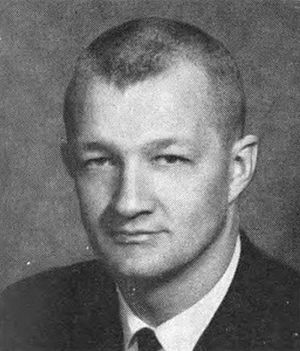Gale Schisler facts for kids
Quick facts for kids
Gale Schisler
|
|
|---|---|
 |
|
| Member of the U.S. House of Representatives from Illinois's 19th district |
|
| In office January 3, 1965 – January 3, 1967 |
|
| Preceded by | Robert T. McLoskey |
| Succeeded by | Tom Railsback |
| Member of the Illinois House of Representatives |
|
| In office 1969–1981 |
|
| Preceded by | George Saal |
| Succeeded by | Jeff Mays |
| Constituency | 46th district (1969–1971) 48th district (1971-1981) |
| Personal details | |
| Born |
Darwin Gale Schisler
March 2, 1933 Knox County, Illinois, U.S. |
| Died | February 2, 2020 (aged 86) Farmington, Illinois, U.S. |
| Nationality | American |
| Political party | Democratic |
| Spouses | Carolyn (m. 1957-1977) Gloria (m. 1980-2020) |
| Children | Three |
| Residences | London Mills, Illinois, U.S. |
| Alma mater | Western Illinois University Northeast Missouri State College |
| Profession | Educator |
| Military service | |
| Allegiance | |
| Branch/service | |
| Years of service | 1952–1955 |
Darwin Gale Schisler (born March 2, 1933 – died February 2, 2020) was an American politician. He served as a representative for Illinois in the United States House of Representatives. He was also a member of the Illinois House of Representatives.
Contents
Early Life and Education
Gale Schisler was born on March 2, 1933, on a farm in Knox County, Illinois. He went to public schools and graduated from Abingdon High School in 1951. In 1952, he joined the United States Air Force. He served for almost four years, including ten months in France.
After leaving the Air Force, Schisler attended Western Illinois University. He played football there and met Carolyn Cochran. They got married and had three children. In 1959, he earned a degree in education. He started teaching at London Mills Junior High School. A year later, he became the school's principal. In 1962, he received a master's degree in school administration.
Serving in the U.S. Congress
In 1964, the Democratic Party in Illinois' 19th Congressional District needed a candidate. Friends of Gale Schisler started a special campaign to get his name on the ballot. This was a "write-in" campaign, where people write a candidate's name on the ballot.
Surprisingly, Schisler won the election. He defeated the person already in office, Robert T. McLoskey. This was a big upset because the district usually voted for Republicans. The district included several counties in Western Illinois.
When he became a member of Congress, Schisler joined the House Science and Astronautics Committee. This committee worked on topics like space exploration.
While in Congress, Schisler supported President Johnson's plans. These plans were called the Great Society. He voted for important laws like the Voting Rights Act of 1965. This law helped protect everyone's right to vote. He also supported the creation of Medicare and Medicaid. These programs help people with healthcare costs. He also voted for the Higher Education Act of 1965, which helped students go to college.
In 1965, the boundaries of congressional districts changed. This change added many Republican voters to Schisler's district. Soon after, Tom Railsback announced he would run against Schisler in the next election. Schisler lost to Railsback in November 1966. The new district boundaries made it harder for him to win.
After his time in Congress, Schisler worked for Governor Otto Kerner Jr.. He helped lead a new office that coordinated state, federal, and local projects. He continued this role under Governor Samuel H. Shapiro.
Illinois State Representative
After leaving Congress, Schisler decided to run for the Illinois House of Representatives. He ran for one of the three spots in the 46th district. This district included Fulton and Tazewell counties. Schisler was elected as the only Democrat from his district. He joined committees focused on education.
In 1971, the district boundaries changed again. Schisler's new district was the 48th. It still included parts of Fulton, Peoria, and Tazewell counties. But it also added new areas like Adams and Brown counties.
In 1974, the Democratic Party gained more power in the Illinois House. Schisler became the head of the Agriculture Committee. He also served on other important groups, like the Illinois-Mississippi Canal and Sinnissippi Lake Commission.
During a time of tension with Iran, Schisler suggested that Illinois universities should not enroll Iranian students. Later that year, he voted against the Equal Rights Amendment. This amendment aimed to ensure equal rights for all citizens regardless of sex.
He lost his re-election bid in 1980. He finished fourth out of four candidates for three seats in his district.
Later Life
Gale Schisler passed away on February 2, 2020, in Farmington, Illinois.
 | DeHart Hubbard |
 | Wilma Rudolph |
 | Jesse Owens |
 | Jackie Joyner-Kersee |
 | Major Taylor |

